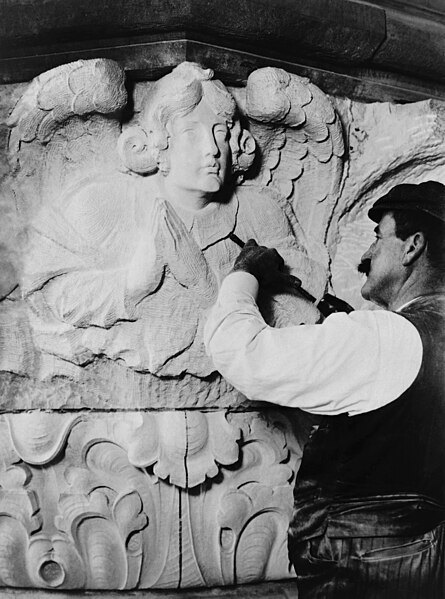Listen to Sermon
Pastor Tom Johnson, September 24, 2017
Today we remember angels. We celebrate these creatures who have no physical bodies like us. Even though we often do not see them, they are busy servants and soldiers of God. They are our protectors. They are God’s messengers to us. That is what angel means—“messenger.” And one of the great messengers of God is the angel Michael. And I love the meaning of his name. It’s actually a question in Hebrew: “Who is like God?” You’ll remember when God made us, he said, “Let us make humankind in our image, after our likeness…So God created man in his own image, in the image of God he created him; male and female he created them” (Gen 1:26,27). Who is like God? We were created to be like him.
But our first parents Adam and Eve disobeyed God. They did not live up to their calling to be God’s stewards and protectors of his creation. They sinned. And to sin is to fall short of the glory of God (Rom 3:23). We fail to honor God perfectly and to be like God to one another and the world he created. This is what happens to the prophet Daniel in our Old Testament reading. He is praying by the river when he has a vision of God who is the likeness and appearance of a man (Dan 10:16,18). I wish I had another 30 minutes to convince you that Daniel sees the eternal Son of God here. This is almost the same vision John has in his Revelation of the risen Christ (Rev 1:9-20). Can you trust me? This is Jesus who died and rose again and ascended to the Father. He steps out of eternity into any point of history he wants. He reveals himself to Daniel. And he has the same effect the glory of Christ always has: John tells us he falls down on his face like a dead man (Rev 1:17). Daniel says his own appearance is fearfully changed, he loses his strength, he falls on his face, and he loses consciousness (10:8,9).
Who is like God? Not Daniel. Not us. Certainly not compared to the surpassing glory of Jesus Christ whose face is as bright as lightning, whose strength destroys death and Satan. He never sleeps. He sustains the whole universe by his Word. Compared to him, our radiance is darkness. Our beautifully clean clothing is filthy rags. We have no strength of our own. Our weakness is so profound that we cannot even stay conscious and wake up to the reality of who is truly like God. Michael’s message is that we live in the end of days. Eternity is about to break out into this world of time and space. God’s Kingdom will be revealed. The heavens will roll back like a scroll. And the Ancient of Days—the eternal Son of God comes to judge the living and the dead. Their message to us is to be prepared.
Who is like God? Michael and the angels seem to be—especially compared to us. They are God’s perfect servants. They are soldiers who fight our battles and God’s battles. And they do so—not in their own strength. The angels conquer—the angels get their power from the power of the blood of the Lamb. On page 23 you will find a picture of a statue of the archangel Michael at the University of Bonn. His breastplate is the Cross of Christ. He conquers by Jesus’ strength—not his own. He wields the flaming sword of the Holy Spirit and the Word of God.
That is always an important thing to remember about angels. They are also creatures. They do not draw attention to themselves. Their job is to humbly and perfectly serve God. They are messengers. They are soldiers. They always point us to Christ and give him the glory and praise. They raise the question, “Who is like God?” No one. “Hear O Israel, the Lord our God is one!” We are called to be like him. Our job is to love him with our whole being and to love one another as Christ has loved us (Deut 6). Just as the Son of God loved us. The Eternal Word became flesh. God became human—in our likeness he was born of the virgin Mary. The great surprise and mystery is that the Second Person of the Trinity became one of us! He became like us so that we will become like him. Who is like God indeed?
The hand of Christ touches Daniel and rouses him to his hands and knees. In John’s Revelation, he puts his hand on him and says, “Fear not, I am the first and the last, and the living one. I died, and behold I am alive forevermore” (1:17,18). And so we rise in the power of the death and resurrection of Jesus. Christ’s nail-scarred hands touch us through his eternal Word. He reminds us that he died for us to break the power sin, evil, and death has on our lives. “If we have been united in a death like his, we will certainly be united with him in a resurrection like his” (Rom 6:5). He rose again so that we will rise to shine more brightly than the midday sun. Like Michael, we lead others to the perfect righteousness of Christ. And together we are the bright constellation of his grace! Who is like God? You are. By God’s mercy and grace we all are.
Lord God, to Thee we give all praise,
With grateful hearts our voices raise,
That angel hosts Thou didst create.
Around Thy glorious throne to wait.
They never rest nor sleep as we;
Their whole delight is but to be
With Thee, Lord Jesus, and to keep
Thy little flock, Thy lambs and sheep.
For this, now and in our days to be.
Our praise shall rise, O Lord, to Thee,
Whom all the angel hosts adore.
With grateful songs forevermore.
(“Lord God, to Thee We Give All Praise” LSB 522 v. 1, 3, & 8)






